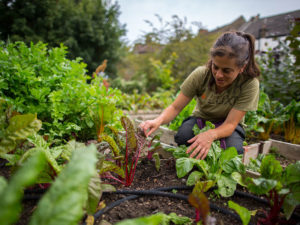Plunkett’s Head of Policy and Communications, Chris Cowcher shares his views on Levelling Up as part of the launch of our new Strategy.
 Last week Plunkett launched a new 5 year strategy, with an ambition to grow the rural community business sector by 20% by 2026. The strategy was shared with members as part of our Annual General Meeting, an event which had been due to take place in person, at St Martin in the Fields, London.
Last week Plunkett launched a new 5 year strategy, with an ambition to grow the rural community business sector by 20% by 2026. The strategy was shared with members as part of our Annual General Meeting, an event which had been due to take place in person, at St Martin in the Fields, London.
At the last minute it was decided that the event should be moved online, recognising that our members and supporters travelling to the AGM faced potential disruption in the crowds that had descended on London, to commemorate and pay their respects to the late Queen Elizabeth II.
Online meetings clearly need to be shorter and as a result our AGM was run using a much reduced agenda. This meant that my (first ever) key note speech was no longer required.
I am sharing my presentation now as I had a few things I wanted to say, both in terms of making the case for recognising rural need and also for community ownership as part of the solution. I look forward to hearing your thoughts, on what I was going to say.
My presentation read as follows:
Whilst the future direction of the Levelling Up agenda is somewhat unknown at present, as we transition between governments, what is clear is that the conversation triggered by the phrase “levelling up” will remain a focus for us all regardless of what Liz Truss’s administration does next.
The central principle; that the UK needs to redress the balance of power, is now something that all political parties are debating and taking a view on – and quite rightly so. It is clear to see a commitment; from government departments, from funders, from infrastructure bodies in our own sector is needed to ensure that those communities and regions that were previously left behind receive targeted support to level up in future.
 In terms of answering the question, have rural communities been forgotten? I would say that they cannot be forgotten. It is clear that if Levelling Up is to succeed then a result of this should be that no one is disadvantaged by where they live – and that includes those living in the countryside.
In terms of answering the question, have rural communities been forgotten? I would say that they cannot be forgotten. It is clear that if Levelling Up is to succeed then a result of this should be that no one is disadvantaged by where they live – and that includes those living in the countryside.
An added but long-standing battle facing those living rural areas, is the misrepresentation of the “rural idyll”. Too many people assume that living in the countryside is only for affluent people, and that the residents that live there aren’t facing the same kind of challenges as those living in more built up and urban areas.
Even in our world of work, the community-owned businesses supported by Plunkett Foundation are sometimes misrepresented by others as ‘hobby projects’ of a wealthy, middle class – completely ignoring the transformative impact these businesses are playing in their community. The ownership of an asset; be it a pub, shop, woodland, library, sports building or any other facility is not in itself the main ambition of the army of volunteers behind these community projects. It is what happens within the assets, or by using these assets for local benefit once they are in community-ownership where the real impact truly exists.
In answering the question about whether rural communities have been forgotten in this moment, I broke my presentation up in to four areas, as follows.
 In conclusion, I do not think that rural communities have been forgotten in relation to levelling up but it is clear that the delivery of this key societal agenda will need to be mindful that a “one-cap-fits-all” approach does not work. I have made the case for rural communities in the broadest terms in my presentation, however I could equally have set out the differing definitions of rurality UK-wide and a provided a much longer list setting out the unique needs in different areas.
In conclusion, I do not think that rural communities have been forgotten in relation to levelling up but it is clear that the delivery of this key societal agenda will need to be mindful that a “one-cap-fits-all” approach does not work. I have made the case for rural communities in the broadest terms in my presentation, however I could equally have set out the differing definitions of rurality UK-wide and a provided a much longer list setting out the unique needs in different areas.
We have a hugely diverse nation and it is important that community empowerment is not something that is delivered centrally. Communities in England, Scotland, Northern Ireland and Wales need to be trusted and supported to deliver what their community needs. If levelling up is to succeed then I fully believe that a measure of its success will be a flourishing network of community-owned businesses, the length and breadth of the country.





